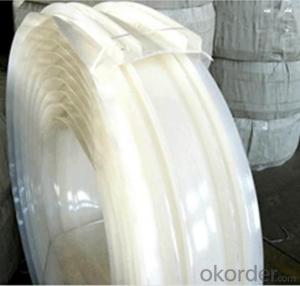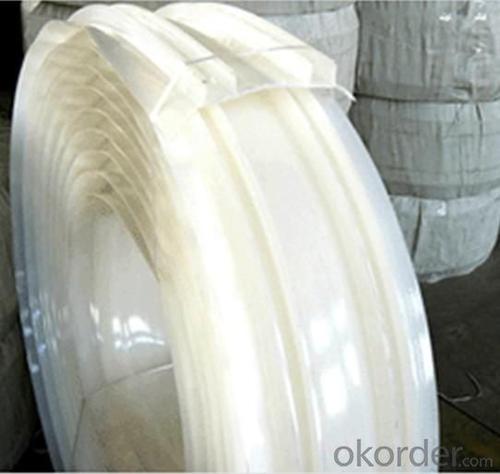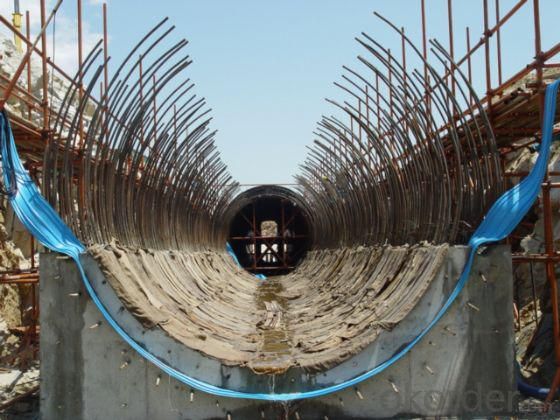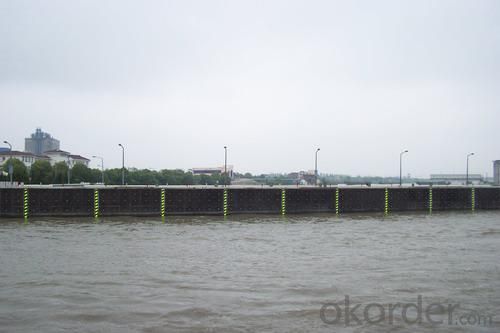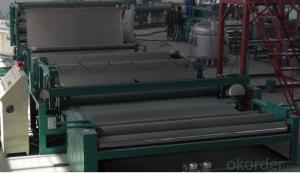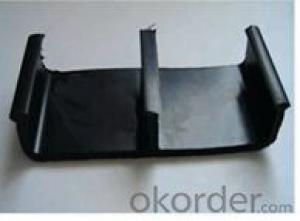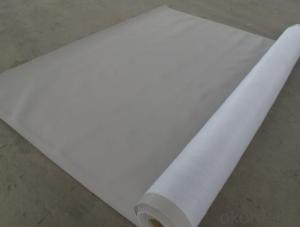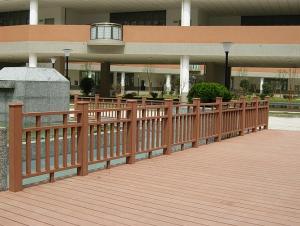EVA waterstops
- Loading Port:
- China Main Port
- Payment Terms:
- TT OR LC
- Min Order Qty:
- -
- Supply Capability:
- -
OKorder Service Pledge
OKorder Financial Service
You Might Also Like
EVA waterstops
Products Description
PVC,EVA waterstops is made of high grade polyvinyl chloride and features unique design and advanced
process. It is applicable for various joints during construction and use. Simple use and easy combination
in construction site.
Products Specification
Thickness :1.0-4 .0 mm
Width :15-30CM
Length: 20M
Features
● PVC, EVA waterstops for sealing construction and expansion joints of reinforced concrete (expansion joint),
placed in the concrete water stop, across and close the gap, forming a solid watertight seamless screen, to
prevent fluid flow through .
● PVC, EVA waterstops with a variety of different shapes, such as middle and external design, in any ground
or underground construction, the formation of a long and solid watertight network, especially for water and
retaining the the structure.
Physical Properties
Items |
| ||
Hardness(A) |
≥80±5 | ||
tensile strength MPa
|
≥13 | ||
Elongation,%
| ≥300% | ||
tear strength KN/m | ≥25 | ||
brittleness temperature ℃ |
≤-30 | ||
|
| ||
|
| ||
Installiton
PVC water stop rubber water stop with the same installation method. When buried in the poured concrete interface
to make it fit with the flat part of the adhesive fastening joints, buried in the process of pouring the power to appropriate
the full vibrating the concrete, making it a good combination with concrete, in order to obtain the best sealing effect .
Application Range
Different shapes of PVC,EVA Waterstops centrally and extermally placed allow lasting watertight seals in any grades
of construction design. They are typically used in water retaining and excluding structure, such as reservoirs, sewage tanks,
dams, pools, basements,subway, tunnels retaining walls, etc.
- Q: Can a waterproofing membrane be used in swimming pools or other water features?
- Certainly, swimming pools or other water features can indeed utilize a waterproofing membrane. In fact, it is highly advisable to employ such a membrane in these areas to avert water leakage and potential harm. By serving as a barrier between the water and the surrounding structures, a waterproofing membrane ensures that the water remains contained within the pool or water feature. Not only does it prevent water seepage, which can inflict structural damage and necessitate expensive repairs, but it also safeguards the pool or water feature from the harsh chemicals employed for water treatment, thereby guaranteeing its durability and long lifespan. Consequently, the utilization of a waterproofing membrane is an essential measure in the construction or renovation of swimming pools or other water features, guaranteeing their functionality and longevity.
- Q: Are waterproofing membranes suitable for rooftop gardens?
- Rooftop gardens require proper waterproofing to prevent water leakage and structural damage. Waterproofing membranes, made of materials like rubber, PVC, or modified bitumen, create a barrier to stop water from entering the building. These membranes are highly resistant to water penetration. Without reliable waterproofing, excess water from irrigation or rainfall can damage the building, fostering mold growth and deterioration. Waterproofing membranes effectively seal the rooftop, preventing water infiltration and providing a long-lasting solution. Moreover, waterproofing membranes offer additional benefits. They protect against root penetration, safeguarding the roof structure. They also regulate building temperature by reducing heat absorption, enhancing energy efficiency. It's crucial to hire professionals with expertise in waterproofing systems for membrane selection and installation. They ensure proper installation, defect-free membranes, and integration with other roofing components. In conclusion, waterproofing membranes are suitable for rooftop gardens. They protect against water ingress, root penetration, and structural damage, allowing rooftop gardens to thrive while maintaining the building's integrity and longevity.
- Q: Is a waterproofing membrane resistant to gasoline or other petroleum-based substances?
- Waterproofing membranes are typically able to resist gasoline and other substances that are petroleum-based. These membranes are commonly manufactured from materials like polyurethane or PVC, which are recognized for their ability to withstand chemicals and petroleum products. This resistance guarantees that the membrane remains intact and effective at preventing water from infiltrating even when it is exposed to gasoline or other petroleum-based substances. However, it is crucial to mention that the actual level of resistance may vary depending on the type and quality of the waterproofing membrane being used. It is recommended to seek advice from a professional or review the product specifications to ensure that the selected membrane is suitable for the intended application involving gasoline or petroleum-based substances.
- Q: Sbs modified asphalt waterproof membrane polyester type Ⅰ type Ⅱ how to distinguish
- SBS modified asphalt waterproofing membrane is SBS rubber modified petroleum asphalt cited as the invasion coating, polyester fiber non-woven fabrics, jute cloth, fiberglass mats were made for the fetal base, the plastic film for the anti-sticking isolation Layer, by the selection, ingredients, eutectic, invasion, composite molding, curling and other processes processing production.
- Q: Is a waterproofing membrane resistant to hydrochloric acid or other corrosive substances?
- Waterproofing membranes are designed to resist water penetration and are commonly used as a barrier against moisture. However, it is important to understand that the resistance of a waterproofing membrane to hydrochloric acid or other corrosive substances may vary depending on the specific material used. Some waterproofing membranes, like those made from bituminous or rubberized asphalt materials, have a higher resistance to chemicals such as hydrochloric acid. These membranes are often utilized in industrial settings where exposure to corrosive substances is frequent. They are specifically engineered to endure the effects of these substances and offer long-lasting protection. On the contrary, other types of waterproofing membranes, such as those composed of polyvinyl chloride (PVC) or high-density polyethylene (HDPE), may have a lower resistance to corrosive substances like hydrochloric acid. These membranes are typically employed in less demanding applications where chemical exposure is not a significant concern. Regardless, it is essential to refer to the manufacturer's specifications and guidelines when assessing the resistance of a particular waterproofing membrane to hydrochloric acid or other corrosive substances. The manufacturer can provide detailed information on the membrane's chemical resistance properties and offer guidance on its suitability for specific applications involving corrosive substances.
- Q: Can a waterproofing membrane be used in swimming pools or water features?
- Yes, a waterproofing membrane can be used in swimming pools or water features. Waterproofing membranes are often used in these applications to create a barrier between the water and the surrounding structure. This helps prevent water leakage and damage to the structure, ensuring the longevity and durability of the swimming pool or water feature. The membrane is typically applied to the surface of the structure and can be made of various materials such as rubber, PVC, or bitumen. It is important to choose a membrane that is specifically designed for underwater applications to ensure its effectiveness in providing a watertight seal. Additionally, proper installation and regular maintenance of the waterproofing membrane are crucial to ensure its long-term performance.
- Q: Can a waterproofing membrane be used for military facilities?
- Yes, a waterproofing membrane can be used for military facilities. Waterproofing membranes are designed to provide a protective barrier against water infiltration, which is essential for preventing damage to structures and equipment. In military facilities, such as barracks, hangars, or command centers, the use of a waterproofing membrane can help ensure the integrity of the building envelope, protecting it from moisture intrusion, mold growth, and potential structural damage. Additionally, a waterproofing membrane can also enhance the durability and longevity of the facility, reducing the need for costly repairs and maintenance over time. Therefore, the application of a waterproofing membrane is highly beneficial for military facilities as it ensures a robust and resilient infrastructure capable of withstanding various environmental conditions.
- Q: Are there any drawbacks or limitations to using a waterproofing membrane?
- Yes, there are some drawbacks and limitations to using a waterproofing membrane. One limitation is that the installation process can be time-consuming and labor-intensive. Waterproofing membranes often require careful surface preparation and multiple layers, which can be time-consuming and may require skilled labor. This can increase the overall cost of the project. Another limitation is that waterproofing membranes may not be suitable for all surfaces. Some membranes are designed specifically for certain types of substrates, such as concrete or metal, and may not adhere properly to other materials. It is important to select the appropriate type of membrane for the specific surface to ensure proper adhesion and effectiveness. Additionally, waterproofing membranes can be sensitive to environmental conditions. Extreme temperature fluctuations, UV exposure, and chemical exposure can degrade the membrane over time, reducing its effectiveness. Regular inspections and maintenance may be required to ensure the longevity of the membrane. Furthermore, waterproofing membranes can be susceptible to damage during installation or from external factors such as foot traffic or heavy objects. Punctures, tears, or improper installation can compromise the integrity of the membrane and reduce its ability to prevent water infiltration. Lastly, waterproofing membranes may not completely prevent water penetration in certain situations. For example, if there are existing cracks or structural issues in the substrate, water may still find a way to seep through, bypassing the membrane. It is important to address any underlying structural issues before applying the membrane to ensure optimal performance. Overall, while waterproofing membranes offer many benefits in terms of protecting against water damage, it is crucial to consider these limitations and drawbacks to make an informed decision about their use in specific applications.
- Q: Can a waterproofing membrane be used for stadiums or arenas?
- Yes, a waterproofing membrane can definitely be used for stadiums or arenas. In fact, it is highly recommended to use waterproofing membranes in these large-scale structures to protect them from water damage and leaks. Stadiums and arenas are often exposed to various weather conditions, including heavy rain and snow, which can potentially cause water infiltration into the structure. A waterproofing membrane acts as a barrier, preventing water from penetrating the building envelope and causing damage to the structural components, such as concrete or steel. It helps to maintain the integrity of the structure and prolong its lifespan. Additionally, waterproofing membranes can also provide protection against other forms of moisture, such as condensation and humidity, which can lead to mold growth and deterioration of materials. Therefore, using a waterproofing membrane is a crucial step in ensuring the durability and longevity of stadiums and arenas.
- Q: Can a waterproofing membrane withstand heavy rain or water pressure?
- Yes, a waterproofing membrane is designed to withstand heavy rain or water pressure. The purpose of a waterproofing membrane is to create a barrier that prevents water from penetrating through a structure or surface. These membranes are typically made with materials such as rubberized asphalt, PVC, or EPDM (ethylene propylene diene monomer), which are highly resistant to water and can effectively withstand heavy rain or water pressure. Additionally, these membranes are often reinforced with layers or fabrics to provide added strength and durability. Therefore, when properly installed and maintained, a waterproofing membrane can effectively withstand heavy rain or water pressure, providing reliable protection against water damage.
Send your message to us
EVA waterstops
- Loading Port:
- China Main Port
- Payment Terms:
- TT OR LC
- Min Order Qty:
- -
- Supply Capability:
- -
OKorder Service Pledge
OKorder Financial Service
Similar products
Hot products
Hot Searches
Related keywords
